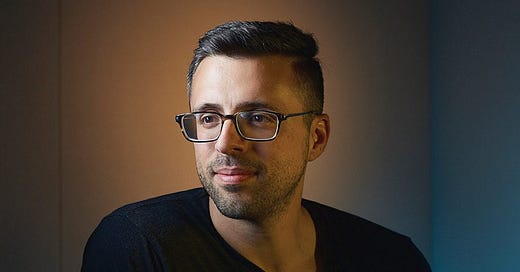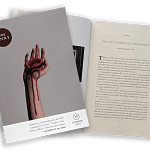It would be very easy to hate Ezra Klein. He’s only 38, and already has been a pioneering political blogger, a pioneering explanatory journalist for the Washington Post, the founder of Vox.com, the author of the best-selling book Why We’re Polarized, and now a marquis podcaster and columnist for the New York Times.
The amount of good fortune that’s come his way is staggering. Not just journalistic and political good fortune, but personal good fortune. His wife, the journalist Annie Lowrey, is a successful journalist with a national profile. Presumably their two kids, whose names are presumably Leo and Daisy, are good looking and brilliant. He’s even rather tall. It’s hard for me to believe this, but the internet says he’s 6’2” (it seems plausible in this photo of him). As journalist Matt Welch wrote of him, in a 2012 profile: “He’s impossibly young, infuriatingly accomplished, and impressively wonky. In a town full of journalistic flop sweat, he glides instead of glistens, handsome enough to make the ladies turn their heads, and affable enough that their boyfriends compete for his attentions, too.”
Klein is an American prince, in other words, and I should hate him just on general principle. But I don’t. He’s so earnest, and so hard-working and diligent and thoughtful. His podcast, which I listen to pretty regularly, is excellent. He’s incredibly sharp and informed about politics and power, in particular, but he’s also omni-curious. There are a lot of political types on the show, but also philosophers, scientists, historians, economists, novelists, political scientists, tech types, you name it.
I say this not to suck up to Klein, but to try to pin down what’s interesting about him, which is actually rather elusive. He’s super smart, but unlike his good friend and fellow Vox co-founder Matt Yglesias, he’s not super smart in a particularly interesting way. He has been a pathbreaker in the form of his journalism at various points – first as a political blogger, then as an early hardcore wonk journalist for the Washington Post, then as a founder of Vox – but it would be hard to identify what particular ideas Klein has been influential in articulating or promulgating.
The big idea with Vox was that it would revolutionize how journalism provides background and context, and it was a bust on that front. His recent book on political polarization sold well and was buzzy for a little while, but I don’t see much evidence that it’s thesis has any staying power. I don’t even remember the thesis. As a thinker, he always strikes me as living in a relatively narrow band somewhere toward the center of wherever the progressive consensus is. So why does he seem so central to it all, and so representative of … something?
To try to answer that, this inaugural episode of the Eminent Americans podcast traces Klein as he molds himself into a punchy political blogger right out of college, and then transforms into an omniscient explainer of the world at the Washington Post and Vox, and then transforms again, into who he is now, this more humble, and more chill, maybe-better-maybe-not version of himself. And we look at how he’s been a cipher/symbol/driver for broader trends in journalism and media the whole time.
My two guests are Matt Welch, author of the greatest of all Ezra Klein profiles, and Mark Oppenheimer, my brother and longtime comrade-in-arms when it comes to parsing the American intellectual scene. Matt is an editor-at-large for Reason magazine, and one of the hosts of the Fifth Column podcast and newsletter, which is hilarious and great. Mark is the author of various books on religion and American culture and, as of a few weeks ago, author of his own substack.














Share this post